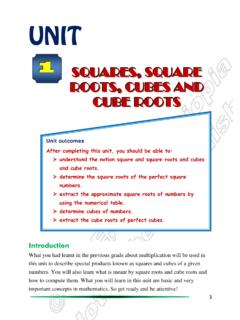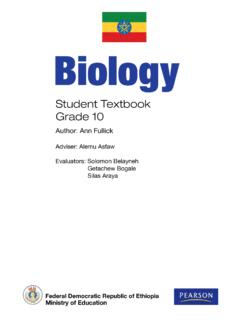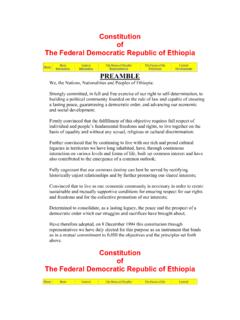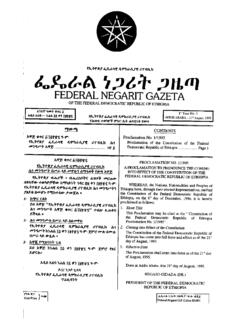Transcription of CIVICS AND ETHICAL EDUCATION
1 CIVICS AND. ETHICAL . EDUCATION . Student Textbook Grade 9. Authors Getaneh Mehari Mesfin Bogale Lakew Regassa Tewodros Mekonnen Edited and revised by Girma Alemayehu Dano Helen Papworth Federal democratic Republic of ethiopia Laxmi Publications Ministry of EDUCATION Acknowledgements The redesign, printing and distribution of this textbook has been funded through the General EDUCATION Quality Improvement Project (GEQIP), which aims to improve the quality of EDUCATION for Grades 1 12 students in government schools throughout ethiopia . The Federal democratic Republic of ethiopia received funding for GEQIP through IDA Credit No. 4535-ET. from the International Development Associations, the Fast Track Initiative Catalytic Fund (FTICF) and other development partners Finland, Italian Development Cooperation, the Netherlands and UK aid from the Department for International Development (DFID). Many individuals and organisations, too many to mention here, also gave their unreserved support to make the textbook and accompanying teacher guide a reality.
2 However, special thanks must go to Myra Murby who devotedly spent time to build the capacity of the Ministry textbook writers to enable them to produce interactive and student friendly teaching and learning materials. The European Union's financial support of Myra's work in ethiopia is greatly appreciated. Gratitude is also extended to the House of Federation of the Federal democratic Republic of ethiopia , the Ethiopian Press Agency, the Ministry of Culture and Tourism, the former Ministry of Information, the Institute of Ethiopian Studies, the Ethiopian Teachers' Association and the Ethiopian Educational Material Production and Distribution Agency, all of which provided pictures that are used in the textbook. The work of Helen Papworth, a VSO volunteer, who, with the former CIVICS and ETHICAL EDUCATION Department, edited, reviewed and formatted the draft textbook and teacher guide, is gratefully acknowledged. Thanks also go to the Voluntary Service Overseas for arranging the placement of British volunteers in the Ministry and enabling us to use their expertise on this and other projects.
3 Federal democratic Republic of ethiopia , Ministry of EDUCATION First edition, 2002 ( ). Redesigned, printed and published for the Ministry of EDUCATION by Laxmi Publications (P) Ltd., India, under GEQIP Contract No. ET-MoE/GEQIP/IDA/ICB/010/09. ISBN: 978-99944-2-000-1. All rights reserved. No part of this publication may be reproduced, stored in a retrieval system or transmitted in any form or by any means (including electronic, mechanical, photocopying, recording or otherwise) either prior written permission of the copyright owner or a licence permitting restricted copying in ethiopia by the Federal democratic Republic of ethiopia , Federal Negarit Gazeta, Proclamation No. 410/2004 Copyright and Neighbouring Rights Protection Proclamation, 10th year, No. 55, Addis Ababa, 19 July 2004. Disclaimer: Every effort has been made to trace the copyright owners of material used in this document. We apologise in advance for any unintentional omissions.
4 We would be pleased to insert the appropriate acknowledgement in any future edition. Contents Introduction 1. Unit 1: Building a democratic System 2. 1. Democracy and the democratic System 3. 2. Rights 7. 3. Obligations 10. 4. Tolerance of Diversity 13. 5. Systems of Government in ethiopia 18. 6. Limits of Power 20. 7. ethiopia 's Foreign Relations 24. Unit 2: Rule of Law 31. 1. constitution 32. 2. Rule of Law 35. 3. Power of Government 37. 4. Rule of Law and Corruption 39. Unit 3: Equality 43. 1. Equality of Nations, Nationalities and Peoples of ethiopia 44. 2. Equality of Citizens in the Ethiopian constitution 46. 3. Gender Equality 50. 4. Equality within Diversity 53. Unit 4: Justice 57. 1. Justice and Equity 58. 2. Justice in Social Services 60. 3. Struggling Against Injustice 62. 4. The Justice System 64. 5. Justice in Taxation 68. Unit 5: Patriotism 72. 1. Citizenship and Patriotism 73. 2. Objectivity in Ethiopian History 77.
5 3. Duties of a Patriot 79. 4. Patriotism and the Fight Against Poverty 82. 5. Voluntarism 84. Unit 6: Responsibility 89. 1. What is Responsibility? 90. 2. Personal, Social and Constitutional Responsibilities 94. 3. Natural Resources and our Historical and Cultural Heritage 97. 4. Responsibility to Combat HIV/AIDS 103. Unit 7: Industriousness 108. 1. Work Hard and be on Time 109. 2. The Importance of Work 111. 3. Economic Systems 113. 4. Work Ethics 116. Unit 8: Self-Reliance 120. 1. What is Self-reliance? 121. 2. Dependency 124. 3. Decision Making 128. Unit 9: Saving 132. 1. Saving and Extravagance 133. 2. Planning and Saving 135. 3. Money as a Source of Wealth 137. Unit 10: Active Community Participation 140. 1. The Meaning of Community Participation 141. 2. The Role of Civic Societies in Community Participation 145. Unit 11: The Pursuit of Wisdom 149. 1. The Basis of Knowledge and Wisdom 150. 2. Information and Data 153. 3. Reading and Studying 155.
6 4. The Pursuit of Truth 157. Introduction T his book is written for students studying CIVICS and ETHICAL EDUCATION in Grade 9. It will guide you through the 11 values with readings, case studies, Readings have a blue background. They provide information which explains the lesson objectives. questions and illustrations to support the text. Each unit On many pages, you will find photographs or pictures begins with an introduction and states the lessons and which illustrate the topic you are studying. the outcomes. It also provides a list of the key words and concepts you will meet in the unit. Case studies are labelled and have a pink background. They provide real or simulated examples of the concept At the end of each unit, there is a summary of what you are studying. you have read. There is also a glossary of some terms or words which you have been introduced to in the Each lesson has at least one set of questions linked to unit. Finally, there are unit review exercises to enable a reading or a case study.
7 Look for the red question you to test your knowledge and understanding of the marks. unit content. At the end of each lesson, you will find a list of points Each unit is set out in the same way with the unit number to remember in a red box. This will help you to revise. and title at the top of each page. This book is just one resource which you and your The objectives are listed at the beginning of each lesson. fellow students will use to learn about CIVICS and ETHICAL A starter activity is in a blue box. This is to introduce EDUCATION at this level. Information to support this you to the lesson. The lesson number is in the top right book will be located with your teacher, on the Plasma corner of each page. programs, in other books and documents, and with people in your communities. CIVICS AND ETHICAL EDUCATION GRADE 9 STUDENT TEXTBOOK 1. Democracy and the democratic Unit 1 System Building a democratic System Introduction This unit is very important as you will learn the basic ideas of democracy and the democratic system.
8 When you complete this unit, it will help you to understand the other units more easily. Lessons Key words and concepts 1. Democracy and the democratic System Ambassador Foreign Policy 2. Rights Autocracy Foreign Relations 3. Obligations Citizen Government 4. Tolerance of Diversity Confederation Human Rights 5. Systems of Government in ethiopia constitution Indirect Democracy 6. Limits of Power Democracy Majority Rule 7. ethiopia 's Foreign Relations democratic system Negotiation Dictatorship Obligations What you will learn Diplomacy Representative You will: Diplomat Democracy appreciate the meaning of democracy. Direct Democracy Rights realize the basic rights of Ethiopian citizens Diversity Tolerance as stated in the Federal constitution . Election Unitary Federation Voting Voting in elections One of the pillars of democracy 2 CIVICS AND ETHICAL EDUCATION GRADE 9 STUDENT TEXTBOOK. UNIT 1 BUILDING A democratic SYSTEM LESSON 1. L E S S O N 1.
9 Democracy and the democratic System By the end of this lesson, you should be able to: this type of democracy, people are involved in the day-to-day decision making of government define democracy. indirectly through their elected representatives. state the characteristics of democracy. This is called representative or indirect democracy. demonstrate some democratic characteristics. The Ancient City of Athens What do you know about democracy? Can you explain your ideas to the class? Give some practical examples to show when you made a democratic decision with your friends, , deciding who is to play in the football team. Is it sometimes difficult to be democratic ? Discuss this as a class. The Parthenon: One of the Seven Wonders of the World What Democracy is? The Modern Athens Democracy is a type of government where people elect their leaders. The ancient Greeks in Athens first practiced it. Women and slaves had no right to elect their leaders and were not able to be elected.
10 In Athens, a council of 500 citizens carried out the day-to-day government's work. However, an assembly of all citizens living in the city-state voted on all-important issues. This is a direct democracy. Today we practice democracy in a different way. Everybody has the right to elect representatives to Parliament, Congress or Shengo. Everyone has the right to stand for election. There is no Athens gave the world Socrates, Plato and Aristotle, systematic mathematics, the Olympics and, above all, discrimination based on sex and occupation. In democracy CIVICS AND ETHICAL EDUCATION GRADE 9 STUDENT TEXTBOOK 3. UNIT 1 BUILDING A democratic SYSTEM LESSON 1. Democracy and the democratic System The word democracy is a combination of two in the present world in limited ways. During Greek words, Demos and Kratos. Demos means referendum and in small communities direct The People and Kratos means Authority. The direct democracy can be practiced.









